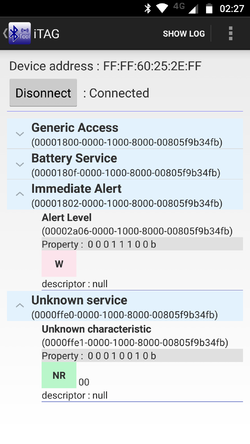AntiLost: Difference between revisions
From RevSpace
No edit summary |
mNo edit summary |
||
| Line 7: | Line 7: | ||
== Introduction == | == Introduction == | ||
This page is about so-called "anti-lost" tags and understanding how to communicate with them. | This page is about so-called "anti-lost" tags (sometimes called iTAG) and understanding how to communicate with them. | ||
They act as a Bluetooth low-energy (BLE) GATT server, implementing a bunch of services. | They act as a Bluetooth low-energy (BLE) GATT server, implementing a bunch of services. | ||
Revision as of 09:38, 18 August 2018
| Project AntiLost | |
|---|---|

| |
| Status | Initializing |
| Contact | bertrik |
| Last Update | 2018-08-18 |
Introduction
This page is about so-called "anti-lost" tags (sometimes called iTAG) and understanding how to communicate with them.
They act as a Bluetooth low-energy (BLE) GATT server, implementing a bunch of services.
This allows them to implement the following functions:
- read out general characteristics of the anti-lost, like the name
- read out battery level of the anti-lost
- enable beeping from the client (e.g. smartphone)
- notify when the button is pressed on the anti-lost
Also:
- start beeping when the connection is lost (silenced by a button press)
Technical
GATT services

See https://en.wikipedia.org/wiki/Bluetooth_Low_Energy#Technical_details
The services exposed by the anti-lost are:
- 0x1800: generic access for name and type of device
- 0x180F: battery service, allows you to read the battery level characteristic
- 0x1802: immediate alert, allows you to make the anti-lost beep
- 0x000FFE0-0000-1000-80000-00805F9B34FB: allows you to get notified when the button is pressed
BLE on ESP32
The ESP32 is capable of doing BLE operations.
In particular, this library allows you to control the anti-lost as a GATT device: https://github.com/nkolban/ESP32_BLE_Arduino Relevant example code is BLE_client.ino